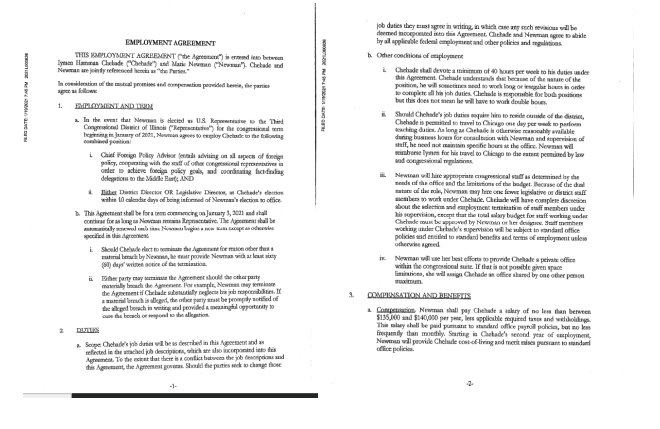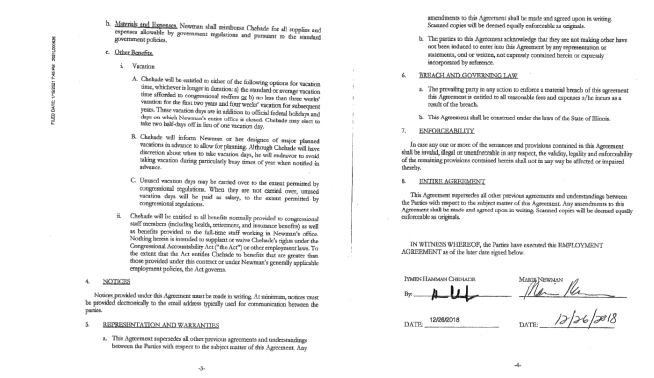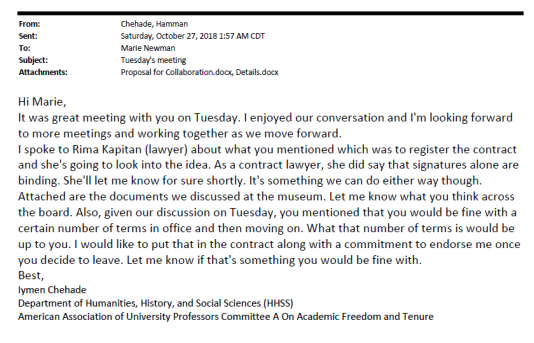Documents revealed by the House Ethics Committee on Monday included emails and other new information that back up ethics watchdogs’ suspicions that Illinois Democratic Rep. Marie Newman signed a contract promising a six-figure salary to a potential primary opponent in order to keep him out of the race.
The committee extended its review of an ethics referral against Newman and on Monday made public the full Office of Congressional Ethics report and exhibits that it says show Newman “may have promised federal employment to a primary opponent for the purpose of procuring political support.” The committee noted that further review “does not itself indicate that any violation has occurred.”
The matter at hand started in 2018 after Newman lost a March Democratic congressional primary for the Chicago-area seat she holds now but was planning to run for again in 2020. Newman, a liberal, unseated centrist Democratic Rep. Dan Lipinski in the rematch.
The investigation may damage Newman’s future election prospects. Redistricting in the state sets her up for a member-on-member primary in the Democratic-leaning 6th District against Rep. Sean Casten.
SUPREME COURT UPHOLDS HOUSE PROXY VOTING INSTITUTED FOR PANDEMIC
In December 2018, Newman signed a contract with Iymen Chehade, a Palestinian American professor at Columbia College Chicago, that stipulated upon beginning her first term in office if she won the election that she would hire him as chief foreign policy adviser and as either district director or legislative director for as long as she remained a representative. It stated that the job would pay Chehade between $135,000 and $140,000 per year.


But Newman did not hire Chehade once she took office in 2021, prompting him to sue Newman. She eventually settled the case.
“In a motion to dismiss Mr. Chehade’s case, Rep. Newman, through her legal counsel, the General Counsel of the U.S. House of Representatives, acknowledged that her contract was violative of House employment and federal contracting rules,” the findings said.
In an interview with the OCE, Newman said that she wanted to hire Chehade because of his foreign policy experience. “In my 2018 race, one of the failures that I had personally that I’m accountable for is that I did not understand the Palestine-Israel issue very well,” Newman said.
But the OCE believes Newman had an ulterior motive.
“The OCE found that Mr. Chehade’s policy expertise was not the only reason she contracted to employ him in the future. Instead, Rep. Newman likely was motivated to enter the agreement to avoid competing against Mr. Chehade in the next Democratic primary,” the report said.
Newman told the OCE that she did not know Chehade was interested in running for office in 2020, but other evidence contradicts that.
In an email to Newman on Oct. 27, 2018, Chehade elaborated on a potential employment contract that they discussed in an Oct. 23 meeting that referenced a future campaign for office.
“Given our discussion on Tuesday, you mentioned that you would be fine with a certain number of terms in office and then moving on. What that number of terms is would be up to you. I would like to put that in the contract along with a commitment to endorse me once you decide to leave,” Chehade wrote in the email to Newman.

He also attached a proposal for the contract that stated, “Chehade agrees not to announce or submit his candidacy for election to Congressional Representative of the 3rd District of Illinois. In exchange, Newman will hire Chehade as her Chief Foreign Policy Advisor.”

Newman told the OCE that she was “outraged” at the terms in that email and called him. “I do remember using expletives in the conversation,” she said.
But the OCE says there is not evidence to back up that such a phone call took place and that Newman responded to the email on Nov. 8 2018, by saying that “most of it looks good” aside from some concerns about “phraseology.”
Chehade refused to cooperate with the ethics investigation, citing a nondisclosure agreement that he signed upon settling his lawsuit. The ethics office recommended that the ethics panel subpoena Chehade.
Federal law states that candidates cannot directly or indirectly propose or pledge employment for the purposes of getting support for their candidacy, the report stated, and House ethics rules state that members “shall behave at all times in a manner that shall reflect creditably on the House.”
In a response to the ethics report, Newman’s counsel told the committee that the charges were “prodded by an ideologically hostile group” (the Foundation for Accountability and Civic Trust filed a complaint with the ethics office in May 2021) and that the ethics office did not include in its report potentially exculpatory evidence that Newman provided. For instance, Chehade sent multiple text messages indicating interest in a Senate run rather than a House run.
CLICK HERE TO READ MORE FROM THE WASHINGTON EXAMINER
“The sole legal issue, involving a rarely enforced statute that does not even apply here, can be readily dismissed,” Newman’s counsel said.
According to Newman’s legal counsel, her relationship with Chehade started breaking down in April 2019 over his support for the Boycott, Divestment, Sanctions movement against Israel, which she did not reflect. “I deeply hope you will be able to support me, but I cannot be bullied in any way by any group,” Newman wrote to Chehade on April 21.
